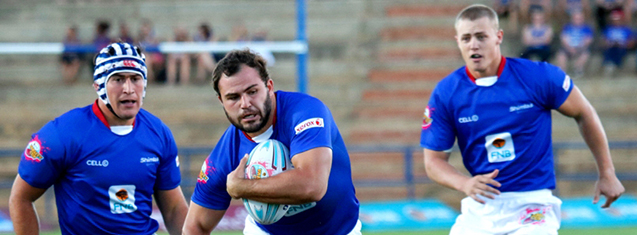
The Shimlas remain the only unbeaten side in this year’s Varsity Cup rugby tournament after their bonus-point 44-24 win against the University of Cape Town Ikeys in Bloemfontein.
The home side managed a very comfortable 34-8 lead in the first half against the defending champions Ikeys. No matter how hard the Ikeys fought back, the Shimlas win was inevitable, and secured the first ever home semifinal at the UFS.
It was in the second minute that Shimlas’ Gerhard Olivier went over the try line. The Shimlas continued to press forward, and kept the game play primarily in the UCT half of the field. By the time the first Strategy Break came along, the Shimlas already had a 21-0 lead over their visitors. The Ikeys did manage one converted try before halftime, still leaving the home side with a 34-8 lead.
After halftime, there was still no stopping the Shimlas. Even when UCT’s attempt at a comeback saw them scoring their second converted try, the point difference were still 18 points. Shortly after, Olivier scored his third try for the Shimlas. The Ikeys’ response to this was scoring a third try in their comeback effort, putting the scoreboard at 39-24 with Shimlas still in the lead after 65 minutes.
Despite Ikeys’ attempt for their bonus point try near fulltime, Shimlas’ counter-attack saw their replacement player Boela Venter cross the try line for the last time to secure a 44-24 win for the home side.
The Shimlas will host North-West University’s Pukke side at Shimla Park in the last round of the tournament this coming Monday. For the first time since the Varsity Cup’s inauguration in 2008, the UFS side has already secured a home semifinal for the week after.
Shimlas point scorers:
Tries: Gerhard Olivier (3), Johan van der Hoogt, Danie Maartens (2), Boela Venter
Conversion kicks: Niel Marais (3)